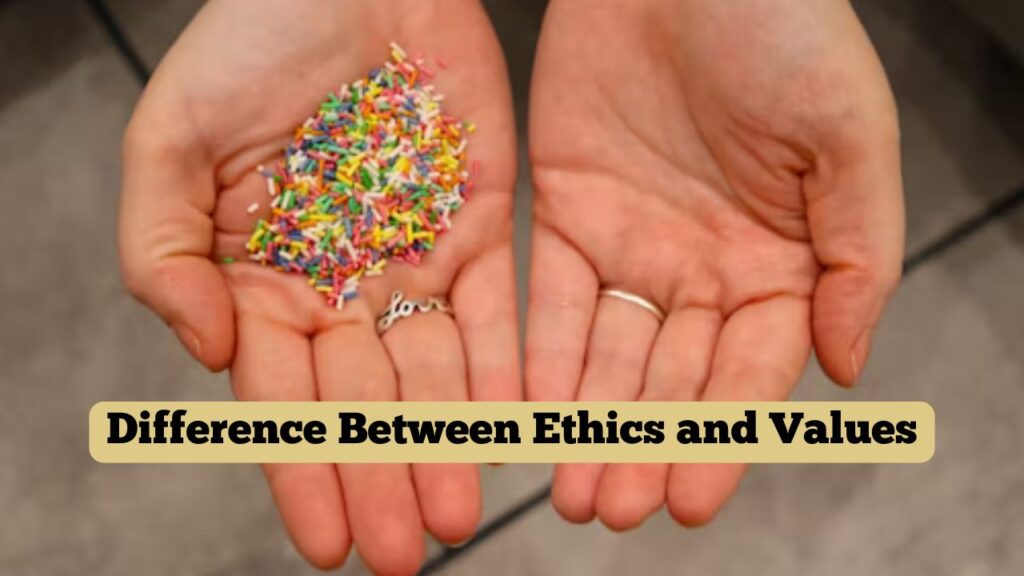Introduction To Difference Between Ethics and Values
In a complex world where decisions shape our personal and professional lives, understanding the concepts of ethics and values becomes crucial. These terms, often used interchangeably, actually have distinct meanings and implications. This article delves into the difference between ethics and values, highlighting their importance in guiding behavior and decision-making processes. https://quesonlosvaloreseticos.com/diferencia-entre-etica-y-valores .
The Importance of Understanding Ethics and Values
Ethics and values play a fundamental role in shaping our actions, beliefs, and interactions. By comprehending their differences and interplay, we can make more informed decisions and contribute positively to society.
Defining Ethics and Values
What are Ethics?
Ethics refer to a set of moral principles or rules that guide behavior and decision-making based on notions of right and wrong. They are often derived from societal norms, professional codes, or philosophical theories. Ethics provide a framework for evaluating actions and determining what is morally acceptable.
What are Values?
Values are deeply held beliefs or ideals that guide an individual’s behavior and decision-making. They reflect what is important to a person and influence their priorities and actions. Values can be shaped by culture, religion, personal experiences, and education. Unlike ethics, values are highly personal and can vary greatly from one person to another.
Also Read : 300 Win Mag vs 308: Comparison of Two Iconic Rifle Cartridges
The Key Differences Between Ethics and Values
Origin and Foundation
Ethics are generally established by societal norms, professional codes, and legal standards. They provide a collective understanding of right and wrong within a community or organization. In contrast, values originate from within an individual, shaped by personal experiences, culture, and upbringing. They reflect what a person deems important and significant in their life.
Universality vs. Individuality
Ethics tend to be more universal, applying to all members of a society or organization. They create a common ground for evaluating behavior and making decisions. Values, on the other hand, are highly individualistic. They vary from person to person, reflecting unique perspectives and priorities.
Flexibility and Consistency
Ethics are generally consistent and less flexible, as they are based on established principles and norms. They provide a stable framework for behavior across different situations. Values, however, can be more flexible and adaptable. As individuals grow and experience new situations, their values can evolve and change over time.
The Role of Ethics in Society
Ethical Principles and Norms
Ethics establish principles and norms that guide behavior in society. These principles help maintain order, fairness, and justice. They set expectations for behavior in various contexts, such as in professional settings, legal systems, and interpersonal relationships.
The Impact of Ethics on Behavior
Ethical principles influence behavior by providing guidelines for what is considered acceptable or unacceptable. They help individuals navigate complex situations, make moral choices, and act in ways that benefit the greater good. Adhering to ethical standards fosters trust, respect, and cooperation within a community.
Ethics in Professional and Personal Life
In professional settings, ethics play a crucial role in maintaining integrity and accountability. Professional codes of ethics set standards for conduct, ensuring that individuals act responsibly and ethically. In personal life, ethics guide interactions and relationships, promoting honesty, fairness, and respect.
The Role of Values in Personal Development
Formation of Values
Values are formed through a combination of personal experiences, cultural influences, education, and reflection. They develop over time and become deeply ingrained in an individual’s belief system. Understanding the origins of one’s values can provide insight into their motivations and behavior.
Core Values and Personal Identity
Core values are the fundamental beliefs that define an individual’s identity and guide their actions. They shape how a person views the world, interacts with others, and makes decisions. Identifying and understanding one’s core values is essential for personal growth and development.
The Influence of Values on Decision-Making
Values play a critical role in decision-making by influencing priorities and choices. They help individuals assess situations, weigh options, and determine the best course of action. Decisions aligned with personal values lead to greater satisfaction and fulfillment.
How Ethics and Values Interact
Ethical Dilemmas and Value Conflicts
Ethical dilemmas often arise when there is a conflict between ethical principles and personal values. Navigating these dilemmas requires a careful balance between adhering to ethical standards and honoring personal beliefs. Understanding the interplay between ethics and values can help individuals resolve conflicts and make informed decisions.
The Balance Between Personal Values and Social Ethics
Striking a balance between personal values and social ethics is crucial for maintaining harmony in both personal and professional life. While personal values provide a sense of identity and direction, social ethics ensure that behavior aligns with collective norms and expectations. Achieving this balance fosters personal integrity and social responsibility. https://quesonlosvaloreseticos.com/diferencia-entre-etica-y-valores
Case Studies and Real-Life Examples
Examining case studies and real-life examples can provide valuable insights into how ethics and values interact in various situations. These examples highlight the challenges and complexities of ethical decision-making and demonstrate the importance of considering both ethical principles and personal values.
Developing a Strong Ethical Foundation
Education and Awareness
Education and awareness are key to developing a strong ethical foundation. Understanding ethical principles, theories, and frameworks provides a basis for evaluating behavior and making informed decisions. Continuous learning and reflection help individuals stay informed about ethical issues and challenges.
Practicing Ethical Behavior
Practicing ethical behavior involves consistently applying ethical principles in daily actions and decisions. It requires a commitment to integrity, honesty, and fairness. By practicing ethical behavior, individuals can build trust, respect, and credibility. https://quesonlosvaloreseticos.com/diferencia-entre-etica-y-valores
Encouraging Ethical Culture in Organizations
Organizations play a crucial role in promoting ethical behavior. Creating an ethical culture involves establishing clear ethical standards, providing training and resources, and encouraging open communication. Organizations that prioritize ethics foster a positive work environment and build strong relationships with stakeholders.
Strengthening Personal Values
Self-Reflection and Awareness
Self-reflection and awareness are essential for understanding and strengthening personal values. Regularly reflecting on one’s beliefs, experiences, and actions helps individuals align their behavior with their values. Awareness of personal values provides a sense of direction and purpose.
Aligning Actions with Values
Aligning actions with values involves making conscious choices that reflect one’s beliefs and priorities. This alignment leads to greater consistency, authenticity, and fulfillment. It requires a commitment to integrity and a willingness to stand by one’s principles. https://quesonlosvaloreseticos.com/diferencia-entre-etica-y-valores
Building Resilience Through Core Values
Core values provide a foundation for resilience, helping individuals navigate challenges and adversity. They offer a sense of stability and direction, guiding behavior and decisions in difficult situations. Building resilience through core values involves staying true to one’s beliefs and using them as a source of strength and motivation.
Conclusion
Understanding the difference between ethics and values is essential for making informed decisions and leading a fulfilling life. While ethics provide a universal framework for behavior, values offer a personal guide to what is important and meaningful. By recognizing the interplay between ethics and values, individuals can navigate complex situations, resolve conflicts, and contribute positively to society.
Also Read : Rejected but Trapped by the Alpha King
FAQs
What is the main difference between ethics and values?
Ethics are a set of moral principles that guide behavior and decision-making based on notions of right and wrong, while values are deeply held beliefs that reflect what is important to an individual.
How do ethics influence behavior?
Ethics influence behavior by providing guidelines for what is considered acceptable or unacceptable, helping individuals navigate complex situations and make moral choices.
Can personal values change over time?
Yes, personal values can evolve and change over time as individuals grow and experience new situations. Reflection and personal development can lead to shifts in values.
How can organizations promote ethical behavior?
Organizations can promote ethical behavior by establishing clear ethical standards, providing training and resources, encouraging open communication, and fostering a positive work environment.
Why is it important to balance personal values with social ethics?
Balancing personal values with social ethics is important for maintaining harmony in personal and professional life. It ensures that behavior aligns with both individual beliefs and collective norms, fostering integrity and social responsibility.
How can self-reflection strengthen personal values?
Self-reflection helps individuals understand their beliefs, experiences, and actions, allowing them to align their behavior with their values. This process leads to greater consistency, authenticity, and fulfillment.



